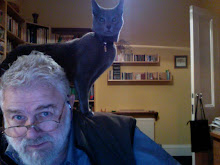 Another post from Brian Duncan
Another post from Brian Duncan Grouchy old pedants such as I - unless we are completely stupid - have long accepted the status of gender-neutral singular pronoun that political correctness has now firmly assigned to "they" and its kin.
We acknowledge that such usage is not only time-honoured, but dignified in the works of masters of English literature (though perhaps there may be a measure of irony in Wodehouse's gloss of "the psychology of the individual" as "what they are like").
We may even, while eschewing the usage ourselves, accept that it is preferable to the clumsy "he or she". In any case, it is no sillier than the formal Italian use of "lei" (= "they") for "you".
However . . . where is the sense in the following from Evan Davis on "Today" the other morning?
| Evan Davis |
" . . . here is someone else who wants to express their view on this topic: Lord Warner . . ."
| Lord Warner |
I acknowledge that my quotation is woefully inaccurate, but the absurdity contained within it is not. That Lord Warner is a man is beyond doubt: were it not so, his title would be "Lady". That "Lord" is a noun of the masculine gender is a matter of fact, even were the sex of its holder a matter of conjecture. Why, then, in the name of all that's reasonable, does Mr Davis find it appropriate to say "their" instead of "his"?




